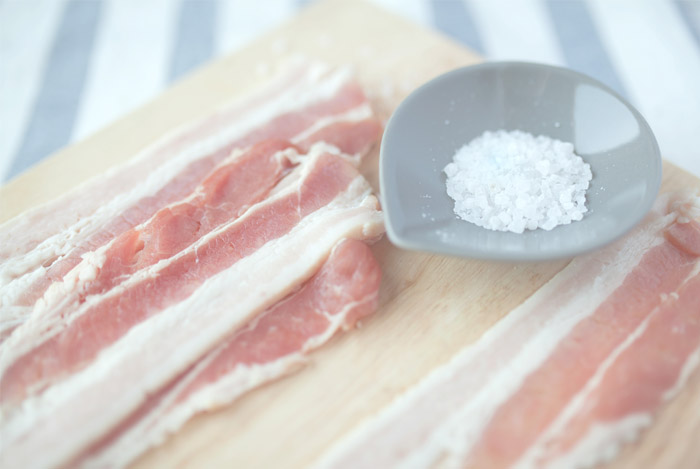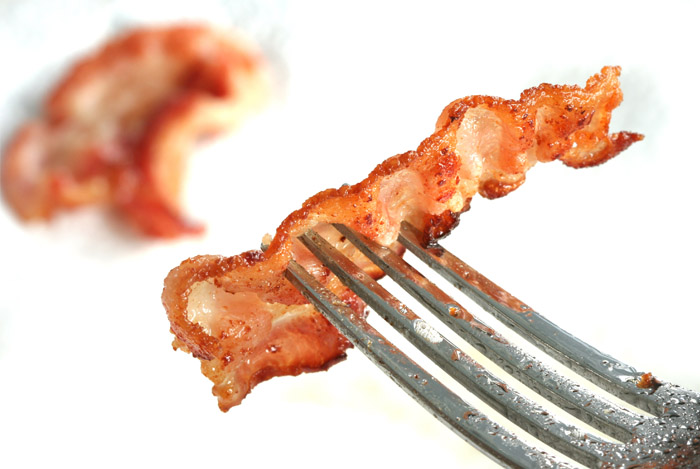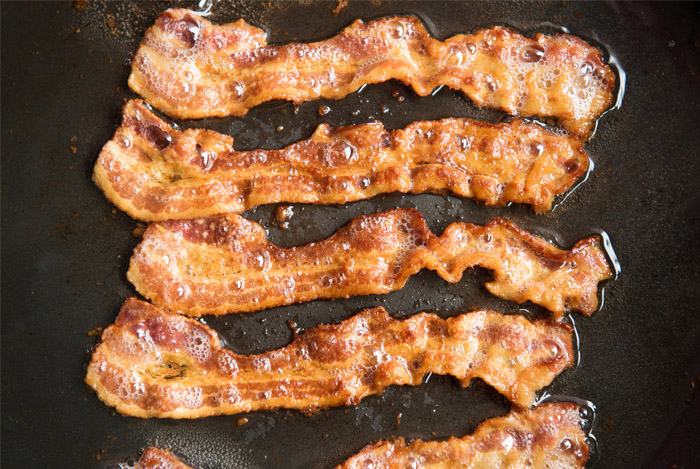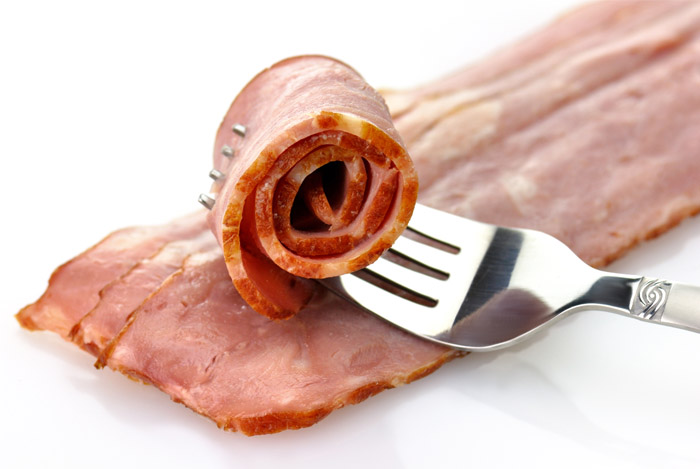Bacon is pretty much a staple in the US diet. In fact, Americans eat an average of 18 pounds of bacon each and every year.
So far gone is our obsession with bacon, that we can now get bacon-flavored bourbon, chocolate, alcohol, mayonnaise, and even ice cream.
For the true bacon fanatics, there are even bacon flavored condoms. Yup – they’re a real thing!
But is this love affair with bacon destined to end in tragedy?
Keep reading to find out what delicious bacon is really doing to us.
Nutritional Profile
 Before we get to bacon’s health effects, have a look at its nutrition stats.
Before we get to bacon’s health effects, have a look at its nutrition stats.
According to NutritionData.com, one slice of cooked bacon (8 grams) contains:
- 41 calories
- 3 g protein – 6% RDV
- 3 g fat – 5% RDV
- 1 g saturated fat – 5% RDV
- 188 mg sodium – 12.5% RDV
- Selenium – 7% RDV
- No carbohydrates
- No fiber
You can see why bacon is often a firm favorite of those following a high-protein, low-carb diet. For such a tasty food, it’s also surprisingly low in calories!
Bacon is also a good source of selenium, an essential nutrient that plays a key role in our metabolism. Conditions like HIV and crohn’s disease have been associated with low levels of selenium.
However, bacon is also high in both saturated fat and sodium, both of which are a cause for concern. One little 8 gram slice contains 12.5% of our recommended daily value (RDV) of sodium…but who eats just one slice?
Crispy bacon is also devoid of vitamin D, A, C, E or K, although it does contain low levels of some of the B vitamins.
Now that we’ve covered some of the highs and lows of bacon’s nutritional content, let me share with you the effects that bacon is having on our bodies.
High Levels of Salt
 While sodium is essential for our bodies – to help maintain the balance of fluids, and in nerve and muscle functioning – too much is a dangerous thing.
While sodium is essential for our bodies – to help maintain the balance of fluids, and in nerve and muscle functioning – too much is a dangerous thing.
It can lead to water retention and boating, high blood pressure, heart disease and stroke.
The American Heart Association recommends that we consume less than 1,500 mg of sodium a day. That’s around 0.75 teaspoons or 3.75 grams of salt.
Let’s be honest, few people eat that little salt, especially when you consider the crazy high levels of salt hidden in some foods.
Well, bacon is adding to your salt load. If you enjoy just two small pieces, you could be consuming 376 mg of sodium, 25% of your RDV.
And if you’re making a BLT and take into account the sodium in the bread, you could easily be hitting 50% of your RDV of sodium in one small meal.
Research from Britain claims that some bacon can contain three times more salt than others from the same supermarket, with the mouthwatering meat now considered the second biggest source of salt in the UK diet.
I’m betting that we’re not all that different here in the US.
Increased Cancer Risk
 By far the most prevalent health concern surrounding bacon is its link to cancer.
By far the most prevalent health concern surrounding bacon is its link to cancer.
The American Institute for Cancer Research claim that eating less than two strips of bacon a day can increase the risk of developing colorectal cancer by 21%.
According to CBS News, people who eat the most processed meats, around 2 slices of bacon a day, are 19% more likely to develop pancreatic cancer.
In fact, the more you eat, the more your chance of developing the disease increases! The study suggests that if you eat six strips of bacon daily, your pancreatic cancer risk shoots up 57%.
Another study, carried out over 20 years, looked at red meat consumption in the diets of almost 90,000 women aged between 26 and 45. It found that the equivalent of three slices of bacon a day can raise the risk of breast cancer by over 20%.
Researchers claim that swapping the red meat for a combination of legumes, poultry, nuts and fish may reduce the risk of breast cancer.
So what causes bacon to be so deadly?
It may be down to the nitrates that are added to preserve, color and flavor the meat. These can convert into nitrosamines, which are linked to cancer.
The way you cook your bacon may also help carcinogenic substances to form – but more about that later.
Lower Sperm Count & Libido
 Yes, it’s true…your favorite weekend breakfast might be killing your little swimmers.
Yes, it’s true…your favorite weekend breakfast might be killing your little swimmers.
A study, carried out by researchers from Harvard University that analyzed the diets of couples who were struggling to conceive, found that men who eat processed meat – as little as one slice of bacon a day – have lower levels of ‘normal’ sperm than those who eat less.
The study also found that those men who ate fish regularly, particularly white or fatty fish, had a 34% higher sperm count.
Not only might bacon lower your chances of conceiving, it might also kill your desire to try!
Bacon contains a lot of saturated fats, which can lead to poor blood flow. Guys, you know what needs blood flow to function?
Saturated fats also raise cholesterol levels, which can affect libido and performance in both men and women.
Swap the bacon for these libido-boosting foods if you need a little help in the desire department.
Exposure to Toxins & Parasites
 According to Dr Axe, pork should be avoided because of the sheer volume of toxins you are exposing yourself to by eating it.
According to Dr Axe, pork should be avoided because of the sheer volume of toxins you are exposing yourself to by eating it.
This happens for several reasons. The digestive system of pigs is rather basic, meaning they digest foods so quickly that toxins don’t have time to be eliminated. They also don’t have sweat glands, one of the main ways our bodies detox.
Pigs also carry a ton of parasites with one of the biggest worries being trichinosis, a parasitic worm that is easily transmitted to humans through under cooked pork.
This worm brings on severe symptoms, which the Center for Disease Control and Prevention (CDC) claim can hang around for weeks…or even months.
It’s recommended you both freeze and cook any pork meats before eating to kill these parasites.
Do you really want to eat something you need to kill off worms in first?
Let’s not forget the toxins from actually cooking the pork.
Meat cooked at high temperatures, as bacon often is, can cause the formation of both polycyclic aromatic hydrocarbons and up to 20 types of heterocyclic amines, toxic substances that are linked to cancer.
And if you use a non-stick pan to cook your bacon, you’re exposing yourself to a whole other list of toxins – check out my post for the lowdown on cast iron vs non-stick cookware.
Promotes Inflammation
 If you’ve read my article on the anti-inflammatory diet, you’ll know that chronic inflammation is at the root cause of most of today’s major health problems. I’m talking asthma, allergies, heart disease, cancer and a whole lot more.
If you’ve read my article on the anti-inflammatory diet, you’ll know that chronic inflammation is at the root cause of most of today’s major health problems. I’m talking asthma, allergies, heart disease, cancer and a whole lot more.
You’ll also know how important it is to stick to foods that are mainly anti-inflammatory. Unfortunately bacon isn’t on that list!
Thanks to the chemical nitrates added to bacon, it can quickly cause inflammation.
Add to that the saturated fats, generally considered a pro-inflammatory food, and you have a winning combination for inflammation…and pain.
This happens because the saturated fatty acids lead to the formation of arachidonic acid, which then converts to inflammatory substances called prostaglandins and leukotrienes.
Heart Disease & Premature Death
 A huge study of almost half a million people – 448,568 to be precise – across 10 European countries found that bacon and other processed meat will kill you.
A huge study of almost half a million people – 448,568 to be precise – across 10 European countries found that bacon and other processed meat will kill you.
Seriously, it will kill you!
Findings show that the biggest consumers of processed meat are 44% more likely to die prematurely from any cause than those who ate little of it.
It seems your heart is seriously affected. High levels of consumption increased the risk of death from heart disease by 72%!
According to the Mayo Clinic, bacon’s sodium nitrate content may not do your heart any favors either.
It’s thought to damage the blood vessels, making arteries more likely to harden and narrow, leading to heart disease.
Increased Diabetes Risk
 The number of people affected by type 2 diabetes is higher than ever before.
The number of people affected by type 2 diabetes is higher than ever before.
It’s estimated that by 2050, one in every three Americans will be afflicted unless something is done to curb the diabetes epidemic.
Cutting down on red and processed meat – including bacon – will help your chances of keeping this unnecessary condition at bay.
Based on research that analyzed the medical records and reported diets of over 440,000 adults, it was found that those who ate processed meat every day – even just two slices of bacon – had a 32% greater risk of developing diabetes.
Regular consumption of red meat was also found to increase the risk of diabetes, although less so than the processed version.
The nitrates may be to blame for the added risk factor, as they can reduce glucose tolerance in the body.
Increased Risk of Liver Disease
 Think liver cirrhosis is only associated with too much alcohol?
Think liver cirrhosis is only associated with too much alcohol?
It turns out that there is also a relationship between pork consumption and cirrhosis of the liver!
Eating pork is associated with liver cancer too. In fact, the correlation between pork consumption and liver cancer is as strong as that for alcohol.
This may be because the food that farmed pigs are fed is high in inflammatory omega 6 fatty acids.
Dr. Mercola believes it’s these omega 6 acids that lead to liver problems, particularly as studies show feeding mice omega 6 rich corn oil and alcohol induces liver disease. Omega 6 fats have also been linked to liver cirrhosis.
If you already have liver disease, then avoiding bacon would be very wise. It’s high in sodium, saturated fat and protein, all things that are difficult for damaged livers to process.
Can Bacon Fit into a Healthy Diet?
 Let’s just say you love bacon too much to give it up, despite all the things it’s doing to your body. Is there any way to add a little to a healthy diet?
Let’s just say you love bacon too much to give it up, despite all the things it’s doing to your body. Is there any way to add a little to a healthy diet?
Well, according to the World Cancer Research Fund, ‘no amount of processed meat is safe’. That includes bacon.
So if you do decide to indulge, make it a very rare treat.
Don’t forget to cook and store it properly. According to SF Gate, bacteria on the bacon can multiply even when refrigerated so make sure to cook it to 145 degrees Fahrenheit to kill bacteria and parasites.
But don’t overcook it either!
In terms of carcinogenic compounds like I mentioned above, the burnt, blackened section of the meat is the most dangerous bit.
Alternatives to Bacon
 You could try turkey bacon. It has a lower fat and sodium content than pork…or even coconut bacon!
You could try turkey bacon. It has a lower fat and sodium content than pork…or even coconut bacon!
Yeah, coconut bacon is a real thing. You get the smoky crunch of pork bacon and all the goodness of coconut.
Don’t get me wrong, it’s not a perfect substitute but it might just curb your craving for the meaty variety without the health concerns.
And don’t forget that the nutrients in bacon (like its high-protein-yet-low-carb content and selenium levels) can also be found in plenty of other, healthier foods.
To start with, check out these delicious, protein packed foods.
If you’re trying to cut down on carbs, here are some tasty low-carb recipe ideas. Remember, you don’t need to cut out carbs completely. Learn how to tell the difference between good and bad carbs here.
To make sure you get enough selenium in your diet, eat more Brazil nuts, whole grains, chia and other seeds, fish and seafood, turkey, and mushrooms.
As delicious and tempting as bacon is, no food is worth putting your health – and life – in jeopardy.
Will you be cutting down on or completely giving up bacon after reading this?
The post 8 Things Delicious, Mouthwatering Bacon is Doing to Your Body appeared first on Nutrition Secrets.
http://www.nutritionsecrets.com/bacon-and-body/
No comments:
Post a Comment